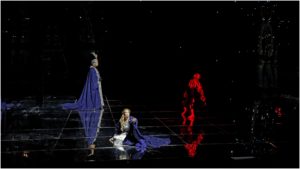
Opera Profile: Strauss’ ‘Die Frau ohne Schatten’
By Logan MartellRichard Strauss’ “Die Frau ohne Schatten,” is an opera composed to a libretto written by Hugo von Hofmannsthal. Premiering on Oct. 10, 1919, the opera faced several problems, critics were unreceptive to the plot, which they felt was over-complicated, and the First World War, which had ended a year earlier, added great difficulty to producing a work which required many scene changes and special effects to capture the plot’s fantastical elements. Thirty years later, however, Strauss would write favorably of the opera due to the impression it was able to make on audiences. In writing the libretto, Hofmannsthal drew on influences from Grimm’s Fairy Tales and the Arabian Nights, weaving them into a fantasy which he compared to Mozart’s “Die Zauberflöte.”
Short Plot Summary
The opera is set within a mythical empire of unnamed islands, the Empress of which is half-divine, being the daughter of Keikobad, king of the Spirit Realm. During an excursion to Earth, where she took the form of a gazelle, she was caught by the Emperor, who is aided in his hunt by a red falcon, and deprived of a magical talisman which allowed her to shape-shift into any form she pleased; now in human form, the mark of the Empress’ inhuman nature is seen by her lack of a shadow, also symbolizing her infertility. Sometime after the wedding between the Emperor and Empress, a messenger from Keikobad arrives with a royal decree: if the Empress is unable to gain a shadow by the end of the twelfth moon, she will be spirited away to her father’s realm and her husband will be turned to stone. To avoid this fate, the Empress and her magical Nurse depart to find a woman willing to sell her shadow.
They find such a woman in the wife of Barak, a simple dyer who desires children, a responsibility his wife fears. The Empress and Nurse enter her home in disguise and show her through magic the luxury she will enjoy in exchange for her shadow. The Wife agrees to their terms to not have relations with her husband for the next three days, at the end of which the royal decree will be fulfilled. While the Empress and Nurse make the housework much easier for The Wife through their magic, they have also created a rift in her marriage to Barak, symbolized in the splitting of their marital bed. A disheartened Barak sleeps on the floor as a chorus sings of the joys of married life.
As the days progress, the marital woes between Barak and his wife deepen, something which fills the Empress with regret due to Barak’s kindness to her. When the destined day arrives and the Wife has sold her shadow, a furious Barak readies to kill her with a sword before he is restrained by his brothers. A sudden earthquake strikes and the married couple is swallowed into the depths below, while the Nurse and Empress escape to Keikobad’s temple, realizing his influence in this.
Deep below the earth, Barak and his Wife find themselves in separate chambers; the Wife regrets the bargain she made and Barak regrets his willingness to murder his spouse. Inside the temple, the Empress pleads with her father for a shadow of her own. Keikobad responds by showing her the Emperor, nearly petrified, and a fountain of life, from which she will gain the Wife’s shadow by drinking out of. The Empress refuses to steal the humanity and happiness of Barak’s wife, and in doing so she earns mercy from her father who frees the Emperor and grants his daughter a shadow. With all being made right between the two married couples, they sing praises unto the unborn children that will come from their respective unions.
Watch and Listen
The abstract concept of the work has allowed for a wide range of production opportunities. Here is one from the Mariinsky Theater under Valery Gergiev. The performance features Avgust Amonov as the Kaiser.
Categories
Opera Wiki

